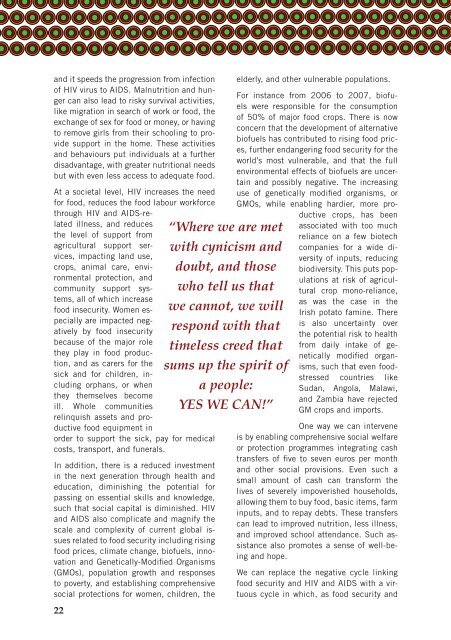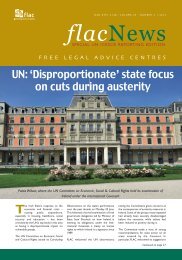HIV & AIDS-A Deep Human Concern
You also want an ePaper? Increase the reach of your titles
YUMPU automatically turns print PDFs into web optimized ePapers that Google loves.
and it speeds the progression from infection<br />
of <strong>HIV</strong> virus to <strong>AIDS</strong>. Malnutrition and hunger<br />
can also lead to risky survival activities,<br />
like migration in search of work or food, the<br />
exchange of sex for food or money, or having<br />
to remove girls from their schooling to provide<br />
support in the home. These activities<br />
and behaviours put individuals at a further<br />
disadvantage, with greater nutritional needs<br />
but with even less access to adequate food.<br />
At a societal level, <strong>HIV</strong> increases the need<br />
for food, reduces the food labour workforce<br />
through <strong>HIV</strong> and <strong>AIDS</strong>-related<br />
illness, and reduces<br />
the level of support from<br />
agricultural support services,<br />
impacting land use,<br />
crops, animal care, environmental<br />
protection, and<br />
community support systems,<br />
all of which increase<br />
food insecurity. Women especially<br />
are impacted negatively<br />
by food insecurity<br />
because of the major role<br />
they play in food production,<br />
and as carers for the<br />
sick and for children, including<br />
orphans, or when<br />
they themselves become<br />
ill. Whole communities<br />
relinquish assets and productive<br />
food equipment in<br />
order to support the sick, pay for medical<br />
costs, transport, and funerals.<br />
In addition, there is a reduced investment<br />
in the next generation through health and<br />
education, diminishing the potential for<br />
passing on essential skills and knowledge,<br />
such that social capital is diminished. <strong>HIV</strong><br />
and <strong>AIDS</strong> also complicate and magnify the<br />
scale and complexity of current global issues<br />
related to food security including rising<br />
food prices, climate change, biofuels, innovation<br />
and Genetically-Modified Organisms<br />
(GMOs), population growth and responses<br />
to poverty, and establishing comprehensive<br />
social protections for women, children, the<br />
22<br />
“Where we are met<br />
with <br />
<br />
who tell us that<br />
<br />
<br />
timeless creed that<br />
<br />
<br />
<br />
elderly, and other vulnerable populations.<br />
For instance from 2006 to 2007, biofuels<br />
were responsible for the consumption<br />
of 50% of major food crops. There is now<br />
concern that the development of alternative<br />
biofuels has contributed to rising food prices,<br />
further endangering food security for the<br />
world’s most vulnerable, and that the full<br />
environmental effects of biofuels are uncertain<br />
and possibly negative. The increasing<br />
use of genetically modified organisms, or<br />
GMOs, while enabling hardier, more productive<br />
crops, has been<br />
associated with too much<br />
reliance on a few biotech<br />
companies for a wide diversity<br />
of inputs, reducing<br />
biodiversity. This puts populations<br />
at risk of agricultural<br />
crop mono-reliance,<br />
as was the case in the<br />
Irish potato famine. There<br />
is also uncertainty over<br />
the potential risk to health<br />
from daily intake of genetically<br />
modified organisms,<br />
such that even foodstressed<br />
countries like<br />
Sudan, Angola, Malawi,<br />
and Zambia have rejected<br />
GM crops and imports.<br />
One way we can intervene<br />
is by enabling comprehensive social welfare<br />
or protection programmes integrating cash<br />
transfers of five to seven euros per month<br />
and other social provisions. Even such a<br />
small amount of cash can transform the<br />
lives of severely impoverished households,<br />
allowing them to buy food, basic items, farm<br />
inputs, and to repay debts. These transfers<br />
can lead to improved nutrition, less illness,<br />
and improved school attendance. Such assistance<br />
also promotes a sense of well-being<br />
and hope.<br />
We can replace the negative cycle linking<br />
food security and <strong>HIV</strong> and <strong>AIDS</strong> with a virtuous<br />
cycle in which, as food security and





